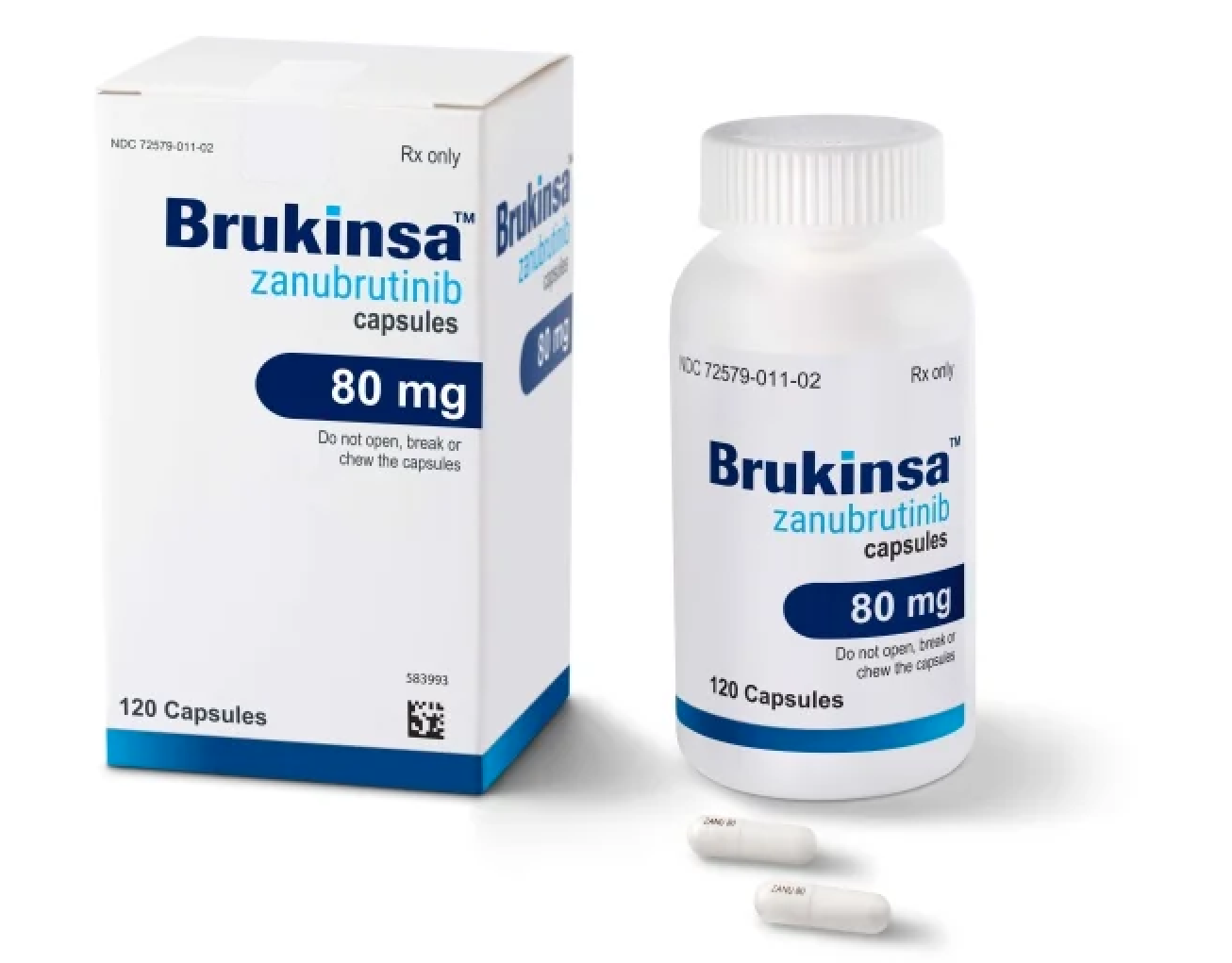Brukinsa (zanubrutinib) vs Columvi (glofitamab-gxbm)
Brukinsa (zanubrutinib) vs Columvi (glofitamab-gxbm)
Brukinsa (zanubrutinib) is a small molecule inhibitor of Bruton's tyrosine kinase (BTK) used primarily for the treatment of mantle cell lymphoma and Waldenström's macroglobulinemia, conditions characterized by B-cell malignancies. In contrast, Glofitamab (Columvi) is a bispecific antibody targeting CD20 on B-cells and CD3 on T-cells, designed to engage and direct T-cells to kill B-cell lymphoma and leukemia cells, and is used in the treatment of various B-cell non-Hodgkin lymphomas. When deciding between these two medications, it is crucial to consider the specific type of B-cell malignancy being treated, the patient's overall health and treatment history, and the differing mechanisms of action and side effect profiles of these therapies.
Difference between Brukinsa and Columvi
| Metric | Brukinsa (zanubrutinib) | Columvi (glofitamab-gxbm) |
|---|---|---|
| Generic name | Zanubrutinib | Glofitamab-gxbm |
| Indications | Mantle cell lymphoma, Waldenström's macroglobulinemia, Marginal zone lymphoma | Under investigation for B-cell non-Hodgkin lymphoma |
| Mechanism of action | Bruton's tyrosine kinase (BTK) inhibitor | Bispecific monoclonal antibody targeting CD20 on B-cells and CD3 on T-cells |
| Brand names | Brukinsa | Columvi |
| Administrative route | Oral | Intravenous |
| Side effects | Neutropenia, thrombocytopenia, anemia, diarrhea, cough | Cytokine release syndrome, infusion-related reactions, infections, fatigue |
| Contraindications | Hypersensitivity to zanubrutinib, severe hepatic impairment | Hypersensitivity to glofitamab or its excipients, severe infections |
| Drug class | BTK inhibitor | Bispecific monoclonal antibody |
| Manufacturer | BeiGene | Roche |
Efficacy
Brukinsa (Zanubrutinib) Efficacy in Treating Lymphoma
Brukinsa (zanubrutinib) is a Bruton's tyrosine kinase (BTK) inhibitor that has shown efficacy in treating certain types of lymphoma. Specifically, it has been approved by the U.S. Food and Drug Administration (FDA) for the treatment of mantle cell lymphoma (MCL) in adults who have received at least one prior therapy. Clinical trials have demonstrated that zanubrutinib can lead to high response rates in patients with relapsed or refractory MCL, with a significant proportion of patients achieving partial or complete remission. The efficacy of Brukinsa in other types of lymphoma, such as marginal zone lymphoma (MZL) and Waldenström's macroglobulinemia (WM), is also being investigated, showing promising results in early clinical studies.
Columvi (Glofitamab-gxbm) Efficacy in Treating Lymphoma
Columvi (glofitamab-gxbm) is a novel bispecific monoclonal antibody designed to target both CD20, a protein expressed on the surface of B-cells, and CD3, a protein found on T-cells. This dual targeting mechanism is intended to recruit the body's own T-cells to attack and kill the B-cell lymphoma cells. While glofitamab is still under clinical investigation and has not yet been approved by regulatory agencies, early clinical trials have shown encouraging results in patients with relapsed or refractory non-Hodgkin's lymphoma (NHL), including those with aggressive forms such as diffuse large B-cell lymphoma (DLBCL). The data suggest that glofitamab can induce responses in a significant number of patients, with some achieving complete remission.
Comparative Efficacy and Considerations
When comparing the efficacy of Brukinsa and Columvi, it is important to consider that they are at different stages of clinical evaluation and approval for lymphoma indications. Brukinsa has already been approved for use in certain patient populations, while Columvi is still undergoing clinical trials. Additionally, the mechanisms of action of the two drugs are different, with Brukinsa inhibiting a signaling pathway critical for B-cell proliferation and survival, and Columvi engaging the immune system to directly attack lymphoma cells. Therefore, the choice of therapy may depend on the specific type of lymphoma, the patient's prior treatment history, and the presence of any comorbid conditions.
Conclusion
In conclusion, both Brukinsa (zanubrutinib) and Columvi (glofitamab-gxbm) represent important advances in the treatment of lymphoma. Brukinsa has demonstrated efficacy in MCL and is being explored for other lymphoma subtypes, while Columvi has shown potential in early trials for treating relapsed or refractory NHL. As research continues and more data become available, these medicines may offer new hope for patients with lymphoma seeking effective treatment options.
Regulatory Agency Approvals
Brukinsa
-
European Medical Agency (EMA), European Union

-
Food and Drug Administration (FDA), USA

Columvi
-
European Medical Agency (EMA), European Union

-
Food and Drug Administration (FDA), USA

Access Brukinsa or Columvi today
If Brukinsa or Columvi are not approved or available in your country (e.g. due to supply issues), you can access them via Everyone.org.
How it works

Make an enquiry
Choose the medicine you want to buy, answer a couple of questions, and upload your prescription to speed things up. We’ll get back to you within 24 hours.


Make an enquiry
Choose the medicine you want to buy, answer a couple of questions, and upload your prescription to speed things up. We’ll get back to you within 24 hours.


Breeze through the paperwork
We'll guide you through the required documents for importing unapproved medicine, ensuring you have all the necessary information.


Get a personalized quote
We’ll prepare a quote for you, including medicine costs and any shipping, administrative, or import fees that may apply.


Receive your medicine
Accept the quote and we’ll handle the rest - sourcing and safely delivering your medicine.

Some text on this page has been automatically generated. Speak to your physician before you start a new treatment or medication.
Let's talk
If you have any questions, call us or send us a message through WhatsApp or email:
Contact us




